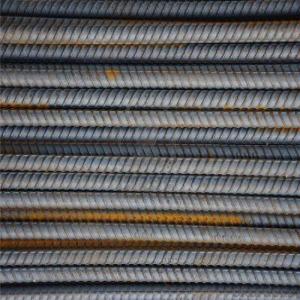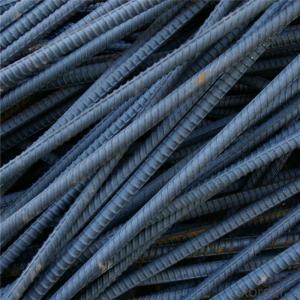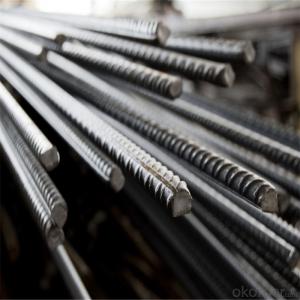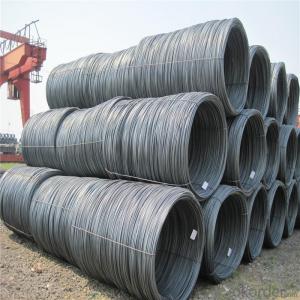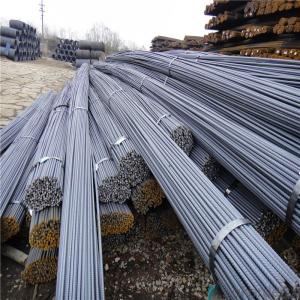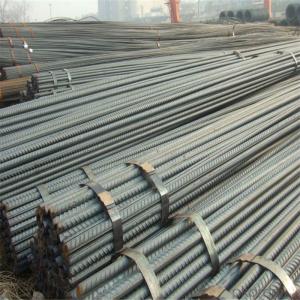Astm Gr60 Steel Reinforcing Rebar
- Loading Port:
- Tianjin
- Payment Terms:
- TT OR LC
- Min Order Qty:
- 120 m.t.
- Supply Capability:
- 500000 m.t./month
OKorder Service Pledge
OKorder Financial Service
You Might Also Like
Item specifice
Astm Gr60 Steel Reinforcing Rebar
Description of Astm Gr60 Steel Reinforcing Rebar
1, Diameter: 5.5mm-10mm Astm Gr60 Steel Reinforcing Rebar
10m- 40mm Astm Gr60 Steel Reinforcing Rebar
2, Length: 6m, 9m, 12m or customized
3, Standard: GB, ASTM, AISI, SAE, DIN, JIS, EN
OEM technology - send detailed technical parameters for accurate quotation.
2, Produce Process: smelt iron - EAF smelt billet - ESR smelt billet -
hot rolled or forged to get the steel round bar and plate
3, Heat Treatment: annealing, normalizing, tempering, quenching
4, Surface Treatment: Black
5, Quality Assurance: We accept third party inspection for all orders.
You can ask testing organizations such as SGS, BV, etc. to test our products before shipping.
Chemical Composition of Astm Gr60 Steel Reinforcing Rebar
Grade | Technical data of the original chemical composition(%) | |||||
Reinforcing steel bar HRB335 | C | Mn | Si | S | P | B |
≤0.25 | ≤1.60 | ≤0.80 | ≤0.045 | ≤0.045 | >0.0008 | |
Physics Capability | ||||||
Yield Strength(N/cm2) | Tensile Strength(N/cm2) | Elongation(%) | ||||
≥ 335 | ≥490 | ≥16 | ||||
Reinforcing steel bar HRB400 | C | Mn | Si | S | P | B |
≤0.25 | ≤0.16 | ≤0.80 | ≤0.045 | ≤0.045 | 0.04-0.12 | |
Physics Capability | ||||||
Yield Strength(N/cm2) | Tensile Strength(N/cm2) | Elongation(%) | ||||
≥ 400 | ≥ 570 | ≥ 14 | ||||
Products Show of Astm Gr60 Steel Reinforcing Rebar
Company Information
CNBM International Corporation is the most important trading platform of CNBM group.
Whith its advantages, CNBM International are mainly concentrate on Cement, Glass, Iron and Steel, Ceramics industries and devotes herself for supplying high qulity series of refractories as well as technical consultancies and logistics solutions.


F A Q
1, Your advantages?
professional products inquiry, products knowledge train (for agents), smooth goods delivery, excellent customer solution proposale
2, Test & Certificate?
SGS test is available, customer inspection before shipping is welcome, third party inspection is no problem
3, Factory or Trading Company?
CNBM is a trading company but we have so many protocol factories and CNBM works as a trading department of these factories. Also CNBM is the holding company of many factories.
4, Payment Terms?
30% TT as deposit and 70% before delivery.
Irrevocable L/C at sight.
5, Trading Terms?
EXW, FOB, CIF, FFR, CNF
6, After-sale Service?
CNBM provides the services and support you need for every step of our cooperation. We're the business partner you can trust.
For any problem, please kindly contact us at any your convenient time.
We'll reply you in our first priority within 24 hours.
- Q:Can special steel be used in the textile industry?
- Yes, special steel can be used in the textile industry. Special steel, such as stainless steel, can be used in the production of various textile machinery components, including needles, pins, and loom parts. It offers durability, corrosion resistance, and strength, making it suitable for demanding textile manufacturing processes. Additionally, special steel can be used in the fabrication of textile machine frames and structures, providing the necessary stability and support.
- Q:How is high-temperature tool steel used in the production of hot work tools?
- High-temperature tool steel is used in the production of hot work tools due to its exceptional heat resistance and strength properties. It can withstand the high temperatures generated during hot work processes such as forging, extrusion, and die casting, without losing its hardness or experiencing deformation. This steel is used to manufacture tooling components like dies, punches, and inserts, ensuring their longevity and performance in extreme heat conditions.
- Q:How does the composition of special steel affect its mechanical properties?
- The composition of special steel plays a significant role in determining its mechanical properties. Special steel refers to a type of steel that has been modified or alloyed with other elements to enhance its strength, toughness, hardness, and other desirable properties. The addition of various alloying elements, such as manganese, chromium, nickel, molybdenum, vanadium, and tungsten, can significantly impact the mechanical properties of special steel. For example, the addition of chromium can improve corrosion resistance and hardness, making the steel more suitable for applications in harsh environments. Manganese is often added to enhance the hardenability and tensile strength of the steel. Nickel can increase toughness and strength while maintaining good ductility. The amount and combination of these alloying elements can be adjusted to achieve specific mechanical properties. For instance, increasing the carbon content can enhance the strength and hardness of the steel, but it may decrease its ductility. On the other hand, decreasing the carbon content and adding elements like nickel and molybdenum can improve the steel's toughness and impact resistance. Additionally, the heat treatment process is crucial in influencing the mechanical properties of special steel. Through processes such as quenching and tempering, the steel's microstructure can be manipulated to achieve desired properties. Quenching, for example, involves rapidly cooling the steel to obtain high hardness and strength, while tempering helps reduce brittleness and improve toughness. In summary, the composition of special steel, including the type and amount of alloying elements, as well as the heat treatment process, plays a crucial role in determining its mechanical properties. By carefully selecting and controlling these factors, manufacturers can tailor special steel to meet specific performance requirements for various applications.
- Q:What are the different methods of surface powder coating for special steel?
- Some different methods of surface powder coating for special steel include electrostatic spraying, fluidized bed coating, and flame spraying. Electrostatic spraying involves applying a charged powder to the steel surface, which is then cured in an oven. Fluidized bed coating involves dipping the steel into a bed of powder that is heated to a fluidized state, allowing the powder to adhere to the surface. Flame spraying uses a flame to melt and propel the powder onto the steel surface, creating a durable coating.
- Q:What are the different methods of analyzing the microstructure of special steel?
- There are several methods used to analyze the microstructure of special steel, including optical microscopy, scanning electron microscopy (SEM), transmission electron microscopy (TEM), X-ray diffraction (XRD), and spectroscopy. Optical microscopy allows for the observation of the steel's microstructure at low magnifications, while SEM provides higher resolution images and can also be used for elemental analysis. TEM is used to study the atomic structure and defects within the steel's microstructure. XRD is employed to determine the crystallographic phases present in the steel, while spectroscopy techniques such as energy-dispersive X-ray spectroscopy (EDS) and X-ray photoelectron spectroscopy (XPS) provide chemical composition information.
- Q:How does special steel contribute to the creep resistance of products?
- Special steel contributes to the creep resistance of products by offering enhanced mechanical properties, such as high tensile strength and toughness, which help to resist deformation and damage over time. Additionally, the unique alloying elements and heat treatment processes used in special steel production further improve its resistance to creep, which is the gradual deformation occurring under prolonged exposure to high temperatures and constant stress. This makes special steel a reliable choice for applications where long-term structural integrity and durability are crucial, such as in high-temperature environments or load-bearing components.
- Q:Can special steel be used for making chemical processing equipment?
- Indeed, chemical processing equipment can indeed be manufactured using special steel. It is common practice to opt for special steels, such as stainless steel, for such purposes due to their remarkable ability to resist corrosion, endure high temperatures, and exhibit durability. Given that chemical processing equipment frequently encounters corrosive substances, operates under extreme temperatures and pressures, it becomes imperative to employ materials that can withstand these demanding conditions. Special steel alloys are specifically engineered to possess exceptional resistance to corrosion, including resistance to acids, alkalis, and other aggressive chemicals. Furthermore, these steels are able to maintain their mechanical properties even when subjected to elevated temperatures, thereby ensuring the equipment's integrity and safety. Consequently, special steel emerges as an appropriate choice for the production of chemical processing equipment.
- Q:Can special steel be used for making defense industry components?
- Indeed, the utilization of special steel in the production of defense industry components is possible. Special steel pertains to a classification of steel that has been deliberately designed and engineered to possess superior attributes and qualities when compared to standard steel grades. These attributes comprise high strength, exceptional toughness, resistance to corrosion, heat resistance, and wear resistance. Within defense industries, the materials utilized for components like armor plates, military vehicles, weapons systems, aircraft structures, and naval vessels must be able to endure extreme conditions while delivering optimal performance. Special steel, with its extraordinary attributes, fulfills these requirements and is frequently employed in the manufacturing of defense industry components. For instance, armor plates employed in military vehicles and personal body armor are commonly constructed from special steel alloys that can withstand ballistic impacts and safeguard personnel. Similarly, aircraft structures and naval vessels necessitate steel that can endure high stresses, corrosion caused by saltwater, and extreme temperatures, all of which can be accomplished through the use of special steel. Furthermore, the ease with which special steel can be machined, welded, and fabricated also contributes to its application in the production of defense industry components. This facilitates efficient production and assembly of intricate defense equipment. Overall, special steel is an essential material within the defense industry as it presents exceptional strength, durability, and performance attributes, rendering it an ideal selection for the production of defense components that must withstand rigorous and demanding conditions.
- Q:How does special steel perform in impact loading conditions?
- Special steel is known for its exceptional toughness and strength, making it highly effective in impact loading conditions. It can withstand high levels of force and absorb energy, resulting in minimal deformation or damage. This makes special steel a reliable choice for applications where impact resistance is crucial, such as in construction, automotive, and aerospace industries.
- Q:What are the requirements for special steel used in aircraft manufacturing?
- The critical nature of aircraft components and the demanding operating conditions they face necessitate stringent requirements for the special steel used in their manufacturing. Here are several key requirements that must be met: 1. Exceptional strength: To withstand the extreme forces and loads experienced during flight, special steel used in aircraft manufacturing must possess exceptionally high strength. This is crucial for maintaining the structural integrity and safety of the aircraft. 2. Lightweight: While strength is important, the special steel used in aircraft must also be lightweight. This is to minimize the overall weight of the aircraft, which in turn enhances fuel efficiency and allows for increased payload capacity. 3. Excellent corrosion resistance: Aircraft are often exposed to harsh environments, including high humidity, saltwater, and various chemicals. Therefore, the special steel used in their manufacturing must exhibit excellent resistance to corrosion. This helps to maintain the structural integrity of the aircraft and prolong its lifespan. 4. High fatigue resistance: Special steel must possess high fatigue resistance to withstand the repetitive loading and unloading cycles that occur during flight. This ensures that the components do not fail prematurely due to cyclic stress. 5. Heat resistance: The special steel should be able to withstand the high temperatures generated by the engines and the heat generated during high-speed flight. This prevents deformation, melting, or loss of strength under extreme thermal conditions. 6. Good weldability: The special steel used in aircraft manufacturing should have good weldability, which allows for efficient and reliable joining of components during the manufacturing process. This ensures strong and secure connections between various parts of the aircraft. 7. Non-magnetic properties: In certain applications, such as electronic systems, it is essential for the special steel to be non-magnetic. This is to prevent interference with sensitive equipment. 8. Traceability and certification: To meet industry standards and regulatory requirements, the special steel must have proper traceability and certification. This includes documentation of its composition, manufacturing process, and testing procedures to ensure consistent quality and performance. Meeting these requirements is vital to ensure the safety, reliability, and efficiency of aircraft. Before being used in the construction of aircraft components, the special steel undergoes rigorous testing, quality control, and certification processes to ensure it meets these stringent requirements.
1. Manufacturer Overview |
|
|---|---|
| Location | |
| Year Established | |
| Annual Output Value | |
| Main Markets | |
| Company Certifications | |
2. Manufacturer Certificates |
|
|---|---|
| a) Certification Name | |
| Range | |
| Reference | |
| Validity Period | |
3. Manufacturer Capability |
|
|---|---|
| a)Trade Capacity | |
| Nearest Port | |
| Export Percentage | |
| No.of Employees in Trade Department | |
| Language Spoken: | |
| b)Factory Information | |
| Factory Size: | |
| No. of Production Lines | |
| Contract Manufacturing | |
| Product Price Range | |
Send your message to us
Astm Gr60 Steel Reinforcing Rebar
- Loading Port:
- Tianjin
- Payment Terms:
- TT OR LC
- Min Order Qty:
- 120 m.t.
- Supply Capability:
- 500000 m.t./month
OKorder Service Pledge
OKorder Financial Service
Similar products
New products
Hot products
Related keywords
